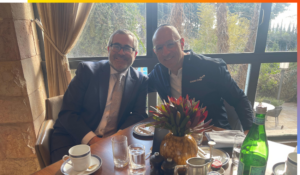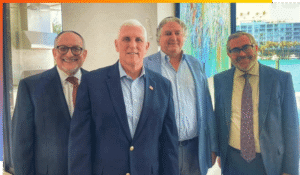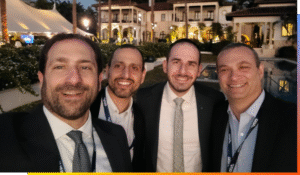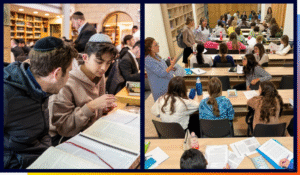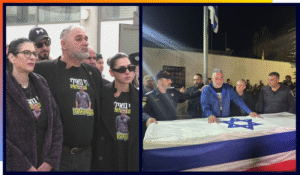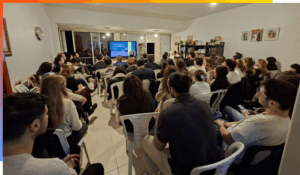What a week it has been. I feel deeply blessed to be back in Israel, and in just a few short days, I have already experienced so much: moments of celebration, moments of mourning, and moments of resolve for the future of our people.
The week began in New York, where I was privileged to join our dear friends, Meyer and Jessica Orbach, at the wedding of their daughter, Eve, to her Chatan Ariel. It was a beautiful simcha, and I felt honored to stand with them. The Orbachs are very much part of our Aish family; their son, Boaz, studied at Aish last year, and Jessica joined our one-week seminary program for Moms (Mominary) as well. They are truly a special family.

From the wedding, I rushed straight to JFK to catch the 2:15 a.m. flight to Israel (yes, there really is such a flight!). When I landed, Israel was again in mourning. While I was in the air, a terrorist attack struck Jerusalem, with six of our brothers and sisters murdered, and four IDF soldiers were killed in Gaza. Yet even in the shadow of tragedy, the work continued. That very evening, Aish hosted another one of our growing series of conversations with Israeli reporters. This time, the topic was ‘What is the depth and scale of the Muslim Brotherhood? Can their networks be dismantled, and how can we flip the narrative regarding Israel and the current war? The speakers, Emily Winkler, Suzan Quitaz, and our very own Rabbi Daniel Rowe. I must thank Raphael Poch and our outstanding communications team, led by Raquela Karamson, who have been organizing these crucial gatherings. And while I only made it for the tail end, I was grateful that Rabbi Daniel Rowe, who in one short year has emerged as the intellectual leader of Aish, was there to provide a sharp, historical, and moral perspective before the discussion turned to combating the modern-day threats which Emily and Suzan spoke about.

The next day brought even more news: IDF bombings in Qatar. Even as we approach the second anniversary of October 7th, the war continues. We remain desperate to bring our hostages home, desperate to end the violence, and desperate to live in peace. Yet we know our enemies will not stop on their own. Those who spill Jewish blood at every opportunity must be confronted.
Soon after, I attended the rescheduled July 4th celebration at the U.S. Embassy in Jerusalem. The irony was impossible to miss: the original celebration had been postponed because of the war with Iran, and now, in its place months later, Prime Minister Netanyahu addressed the crowd about the bombing in Qatar. He spoke powerfully about Israel’s determination to pursue terrorists wherever they may be. Then, as if to underscore the precariousness of our situation, sirens sounded and the entire gathering was rushed indoors.

Still, for me, the highlight of the evening came earlier at the VIP reception. There, I saw David Milstein, senior advisor and chief of staff to Ambassador Huckabee. David, once a student at Aish who came to Jerusalem to deepen his Jewish identity, now represents the United States of America, kippah on his head, standing beside the ambassador. To see our alumni in such positions of impact fills me with indescribable pride.
Amidst all this turmoil, I received the most joyful message: Rachel and I became grandparents again! My son Elie and daughter-in-law Sydney welcomed a beautiful baby girl, our second granddaughter, in just a few months. Together with our mechutanim, the Freedmans, we feel so blessed.

For me, this is the deepest lesson: our greatest response to antisemitism, to terrorism, and to all who hate us is to keep building Jewish families. Yes, we must hold terrorists and antisemites accountable, but the greatest revenge we can offer is to strengthen our people and grow our nation.
The work of Aish this week reminded me of that truth again and again. I spoke to the incoming class of our seminary, inspiring young women eager to embrace Jewish wisdom. I only managed to cover two of Aish’s values, wisdom and love, in an hour, so we had to schedule another session to get to responsibility.

At the yeshiva, we are bursting at the seams yet again, setting new records each year. I even spent time scouting properties in the Old City as we strategize how to expand. Meanwhile, we are also meeting with educators and technologists to explore how AI can help us reach every Jew online. The scope of the work is breathtaking: on the ground in Jerusalem, and globally across the digital landscape.

One story in particular stayed with me. At our reporters’ evening, I met a young woman who shared her remarkable journey back to Judaism. She had once been part of Antifa, a radical activist, and she is covered in tattoos. She confessed that at times she felt uncomfortable walking into Jewish spaces. But she told me she relied on Aish.com, our classes, our resources, our Torah, to guide her back. For her, Aish.com became the bridge to reconnect with her people. This is why our online work is not optional; it is essential.
The week also included time with the World Zionist Congress and with Foreign Minister Gideon Sa’ar, as we work to build strong coalitions for the Jewish future. The conversations were serious, important, and forward-looking.

Then late Wednesday night, news broke that left me shaken. Charlie Kirk had been shot at a campus event in Utah, and later, we learned he had been killed. He was only 31 years old, a husband and father of two. Charlie was a friend of Israel and the Jewish people. On many occasions, he stood up for us and for truth. We should never take allies like that for granted. His murder is a tragedy, and it is also a warning.
For two years now, I have been writing op-eds and speaking out about the unchecked antisemitism on campus. Jewish students have been intimidated, harassed, and even assaulted. Faculty members have encouraged hate. Students chant slogans like “Globalize the Intifada,” which every Jew knows is a call for violence. Yet, because the victims are Jews, too many have ignored it. We are told this is a matter of freedom of speech. But when speech becomes incitement to violence, when it becomes the justification for bloodshed, it is not freedom, it is hate. Everyone knows you cannot shout “fire” in a crowded theater. So how can we excuse chants that glorify killing Jews?
As I have said before, the Jewish people are the canary in the coal mine. What begins with us never ends with us. This week, tragically, a young non-Jewish ally was gunned down on campus. The world must open its eyes. The danger of tolerating hatred on campus is no longer theoretical; it is deadly.
As if to deepen the moral confusion of our times, I watched as European nations condemned Israel for striking back in Qatar against the masterminds of October 7th. On the anniversary of September 11th, Americans remember how America rightfully pursued bin Laden to the ends of the earth. Evil must be confronted. It cannot be reasoned with, excused, or wished away.
Friends, I do not mean to sound overly political. What I mean is deeply Jewish: we must support one another, support Israel, and support the Jewish people. We must stand together. We are a moral nation, an ethical nation, a people who love God and love each other. Aish’s values, Torah, love, and responsibility, must guide us in every generation.
This week, I celebrated the birth of my granddaughter. I taught Torah to our students. I met leaders of nations. I mourned the murder of a friend of Israel. And through it all, I was reminded again: our strength is in our unity, our families, our Torah, and our G-d. That is what keeps us strong.



